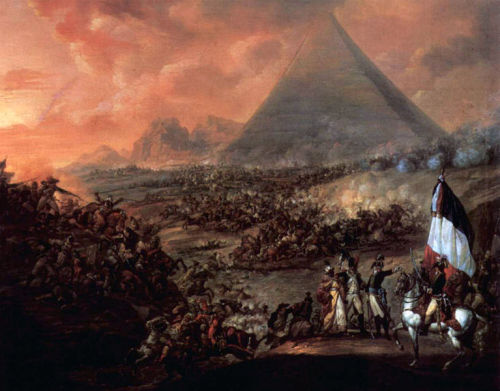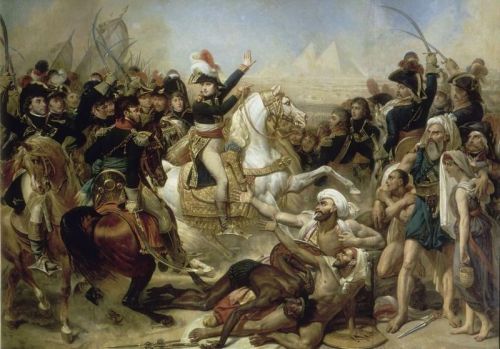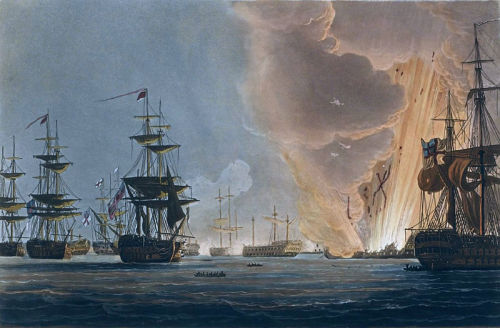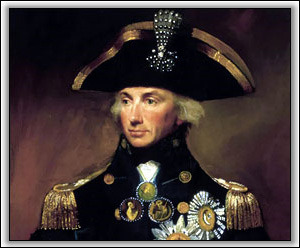Napoleon in Egypt Part I: The Conquest of Egypt,“Soldiers, from the height of these pyramids,
Napoleon in Egypt Part I: The Conquest of Egypt,“Soldiers, from the height of these pyramids, forty centuries look down upon you.”— Gen. Napoleon BonaparteA young general who had just won a major campaign against the Italians and Austrians, Napoleon Bonaparte craved more victories and more glory. While the two powers had yet to face each other in pitched battle, France and Great Britain were at war, and Napoleon had an audacious plan to undermine the British Empire. Egypt was very important to the British both strategically and commercially. The area of what is now the Suez Canal was an important trading route as ships offloaded goods, which where transported by caravan to the Red Sea, where it was eventually shipped through the Indian Ocean to British controlled territories in India. Napoleon intended to conquer Egypt (then a part of the Ottoman Empire), with the intention of cutting Britain’s lifeline to India.On July 1st, 1798 Gen. Bonaparte landed in Alexandria with an army of 35,000 men. After a two week march across the desert, Bonaparte’s army reach Cairo, the capitol of Egypt. There to meet them were 50,000 fierce Mamluk warriors. Then the rulers of Egypt, the Mamluks were a ancient tribe of warriors whose martial tradition can be traced back to the Crusades. While the Mamluks had some muskets, they mostly used the same tactics they had used during the Middle Ages, fighting from horseback armed lances and sabers while infantry fought with swords, shields, and spears. Unfortunately for the Mamluks this was the age of modern warfare, and the French were no Crusaders.The French and Mamluk forces met at the foot of the Great Pyramids of Giza, a spot Napoleon personally chose because he wanted the fame of having won a battle at the foot of the Great Pyramids. The Battle of the Pyramids began with a Mamluk charge of 10,000 heavy cavalry. While such tactics had devastated light infantry in the age of the Crusaders, the Mamluks had little knowledge of modern tactics employed by European armies. Napoleon ordered his units to form square, a basic defensive infantry tactic against cavalry, with his own cavalry in the center and artillery placed at the corners creatingdevastating inter-lapping fields of fire. While the Mamluk charge was courageous, courage was of little use against the wall of lead and grapeshot fired by the French Army. The charge was a bloodbath as Mamluk horseman only made convenient targets for musketeers and artillerymen. 3,000 Mamluk horsemen were instantly obliterated, and the charge quickly morphed into a panicked retreat. On Napoleon’s signal, the French cavalry counterattacked, driving off the surviving Mamluk horsemen. The remaining 40,000 Mamluk infantry, mostly peasants armed with shields and spears, only served as cannonfodder as French muskets and guns made a bloody mess of the dated medieval army. By the end of the Battle of the Pyramids, 20,000 Mamluk warriors lay dead in the Egyptian sands, while Napoleon’s army suffered a scant 29 losses.For Napoleon the conquest of Egypt was one of his greatest achievements of his career at that point. He had accomplished his goal and conquered an ancient and exotic land that was the crown jewel of mighty empires. To Napoleon, life couldn’t get any better, but one of the common themes of the early Napoleonic Wars was that Napoleon would win some major victory or achieve some crowning achievement, only to have an equally audacious and brilliant military commander named Admiral Horatio Nelson sour his success.While Napoleon and his men celebrated the conquest of Egypt, a French support fleet was anchored off the Nile River delta. Ten days after the Battle of the Pyramids, a British fleet under the command of Horatio Nelson ambushed and annihilated the French fleet. Without his fleet, Napoleon was effectively trapped in Egypt with no means of regular communication, no supply lines, and no way of returning home to France. Stranded in Egypt, Napoleon’s great dream was turning into a terrible nightmare. To be continued… -- source link
Tumblr Blog : peashooter85.tumblr.com
#history#napoleonic war#war#battle#horatio nelson#napoleon bonaparte#egypt#mamluk#mamluks



